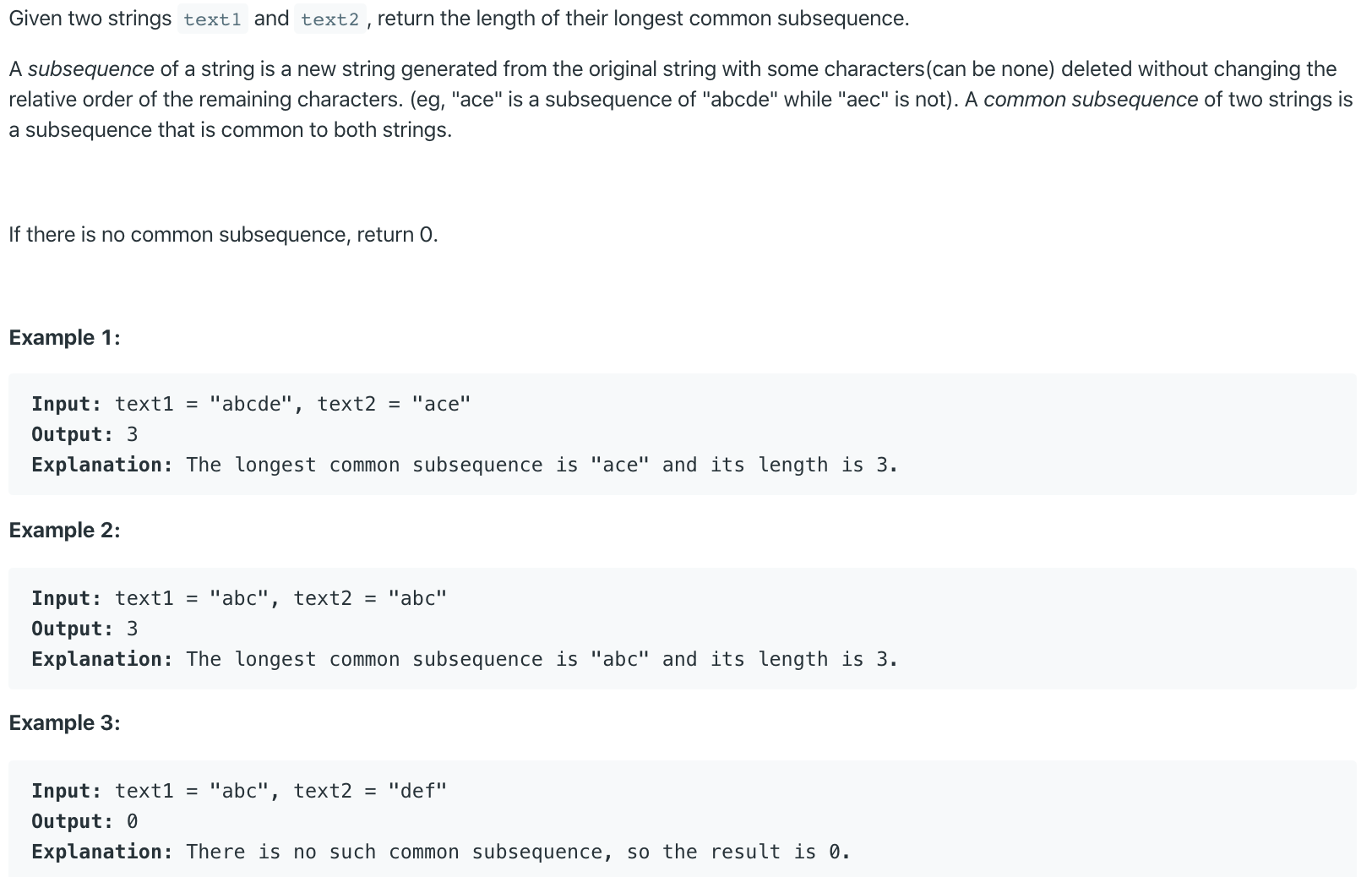Longest Common Subsequence

This problem (opens new window) is very practical. In Unix utility diff, a line of one file is compared w/ that of another. In git diff, a line of newer version is compared w/ that of older version. In this problem, we simply compute the common chars of 2 strings.
# Solution
Let and be lengths of text1 and text2, respectively.
# Initial Wrong Solution
It's wrong b/c subsequence later seen can be longer than a subsequence earlier seen.
This test case failed b/c p is before qr in shorter text1 while after qr in text2.
# test case
text1 = "oxcpqrsvwf"
text2 = "shmtulqrypy"
2
3
def longestCommonSubsequence(self, text1: str, text2: str) -> int:
lcs = 0
l = 0
shorter = text1 if len(text1) <= len(text2) else text2
longer = text1 if len(text1) > len(text2) else text2
for i in range(0, len(shorter)):
# find the shorter ith elt in longer[l:]
j = longer[l:].find(shorter[i])
if j != -1:
l = j + 1
lcs += 1
return lcs
2
3
4
5
6
7
8
9
10
11
12
Instead, this problem should be solved by DP (iterative/recursive w/ memoization).
# Iterative DP (Squared Space)
As explained in this video (opens new window), matrix M is constructed to store the length of longest common subsequence seen so far.
If the two chars in text1 and text2 match, M[i][j] = M[i-1][j-1] + 1 ; otherwise, it's the max of M[i-1][j] and M[i][j-1]. At the end of for loop, return M[-1][-1].
Complexity
time:
space:
def longestCommonSubsequence(self, text1: str, text2: str) -> int:
n,m = len(text1),len(text2)
M = [[0 for _ in range(m+1)] for _ in range(n+1)]
for i in range(1, n+1):
for j in range(1, m+1):
if text1[i-1] == text2[j-1]:
M[i][j] = M[i-1][j-1] + 1
else:
M[i][j] = max(M[i-1][j], M[i][j-1])
return M[-1][-1]
2
3
4
5
6
7
8
9
10
11
# Iterative DP (Linear Space)
This is similar to iterative DP, but has less space. Matrix M only needs previous row to calculate current row, so only 2 rows are needed.
Complexity
time:
space:
def longestCommonSubsequence(self, text1: str, text2: str) -> int:
n,m = len(text1),len(text2)
# find the shorter string
s = text1 if n <= m else text2
l = text1 if n > m else text2
M = [[0 for _ in (len(s)+1)] for i in range(2)]
for i in range(1, len(l)+1):
for j in range(1, len(s)+1):
if s[j-1] == l[i-1]:
M[i%2][j] = M[1-i%2][j-1] + 1
else:
M[i%2][j] = max(M[1-i%2][j], M[i%2][j-1])
return M[-1][-1]
2
3
4
5
6
7
8
9
10
11
12
13
14
15
16
# Recursive DP (REDO)
https://leetcode.com/problems/longest-common-subsequence/discuss/436719/Python-very-detailed-solution-with-explanation-and-walkthrough-step-by-step.
https://leetcode.com/problems/longest-common-subsequence/discuss/398711/ALL-4-ways-Recursion-greater-Top-down-greaterBottom-Up-greater-Efficient-Solution-O(N)-including-VIDEO-TUTORIAL